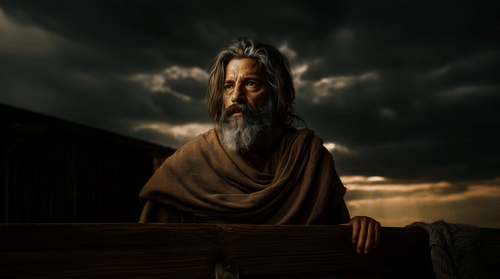
The earth groaned under its own corruption.
Violence filled the land, blood soaked the soil, and pride reigned in the hearts of men.
Genesis tells us that “every inclination of the thoughts of the human heart was only evil all the time” (Genesis 6:5).
The beauty of creation had been twisted into a theater of cruelty.
And then, in that darkness, God’s eye fell on one man:
“But Noah found favor in the eyes of the Lord.” (Genesis 6:8)
Noah was described as “a righteous man, blameless among the people of his time, and he walked faithfully with God” (Genesis 6:9).
Like Enoch before him, Noah walked with God. But unlike Enoch, Noah was not taken away from the world… he was called to live through its judgment.

God’s call was terrifying: “I am going to put an end to all people, for the earth is filled with violence because of them” (Genesis 6:13).
Instead of being swept away with the flood, Noah was commanded to build an ark: an enormous vessel of survival in a world about to drown.
With every hammer strike, with every timber cut, Noah lived as a witness to God’s coming judgment and His promise of salvation.
Imagine what it meant to be Noah.
Imagine, if you can, what it felt like to know that everyone around you, save for a few, would perish.
A lesser man would be relieved to hear he wasn’t doomed like the rest of them… But to a man connected to the heart of God, Noah must have wept.
This was a blessing, yes… but also a burden.

We often sanitize this story for children, painting happy animals and a rainbow arched in the sky.
But Noah’s story is not cute. It is tragic. It is the sound of screams swallowed by waves. It is the weight of judgment on a generation that refused to listen.
If Noah truly walked with God, then surely he carried God’s grief in his own heart.
God Himself said, “The Lord regretted that he had made human beings on the earth, and his heart was deeply troubled” (Genesis 6:6).
If Noah was attuned to that heart, then he, too, must have known the agony of watching life perish.
For Noah, obedience meant salvation. But obedience also meant bearing the knowledge that judgment was unavoidable, and that not everyone would enter the ark.

The story of Noah forces us to wrestle with the reality of sin’s consequences.
God is patient, but sin destroys. Violence corrupts. Pride hardens. And eventually, God’s justice arrives.
We, like Noah, are preserved. Our vessel of salvation isn’t a wooden ark, but a wooden cross. Christ Himself. He is our refuge, our covering, our shelter from the storm of judgment.
But salvation should not make us smug.
It should give us a burden.
Noah could not force others to board the ark, but surely his life, his labor, his very existence was a testimony of God’s warning. We, too, are called to be living witnesses, pointing people toward the refuge found in Christ before the floodwaters rise.
Salvation comes with responsibility… the responsibility to bear God’s heart for the lost.
Like Noah, we are safe in the ark of Christ. But like Noah, we are also called to live with a holy burden: to invite others in before it is too late.
